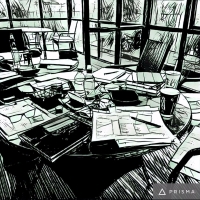There’s lots of good GMing advice for convention games – lots of it on this blog – but less about being a good player. It’s a team sport, though – and if the players bring the awesome as well it just makes everything sing better. So here are four things players can and should do at conventions to help make their games more awesome for everybody.
While you’re reading this, I should tell you about my Patreon. Patrons get access to content 7 days before they hit this site, the chance to request articles or content, and the chance to play in one-shot games, for a very reasonable backer level of £2 per month. If you like what you read, want to support the blog, and have the funds for it, please consider supporting here. Telling people about the blog, and sharing links/retweeting is much appreciated also – thanks!
Engage with the premise
You’re at a convention, playing a one-shot for a few hours. As flexible as the GM has made it, you’re expected to engage with the quest provided. If the princess gets kidnapped in the opening scene, you’d better be going to get her. If the trade routes are plagued by pirates, it’ll be you that will sort it. So don’t prevaricate. Don’t negotiate for better rates. You have literally signed up for this.
“My character wouldn’t do this” is a problem you have to solve, not the GM. Make them interested. Work out an angle that would make them interested (and preferably non-risk-averse) and pursue it. Feng Shui does this – your Melodramatic Hook as a player is your reason to engage with the plot, and it’s up to you to make it work. So make it work.
Pay Attention
Look, conventions can be tiring. Playing with new people can be a social challenge. But try and keep up with what’s happening. Think about what you might do on your turn (in combat) or in the game generally as you listen to other players – it’s the least you can do to engage and pay attention.
Sideways to this, ask useful questions. If you’re interested in something for a reason, share that reason. “Is the guard’s hat purple?” isn’t useful if you’re really trying to work out if he’s a spy for the purple-hatted kingdom or not – the GM doesn’t know what you’re after. So help everyone out and telegraph your intent as well.
Play Up
Get other players involved. After a scene description, a short in-character comment to another PC really helps to ground the game in the setting. It doesn’t have to be great acting, but a bit of table chatter helps everything feel more, well, role-play.
In action scenes, suggest good players to do things, especially if that player seems a bit unsure. “Maybe our thief could sneak up and have a closer look?” may be just the permission the thief’s player needs to have some spotlight time. Be careful with this, though – make suggestions if there’s a pause, don’t strategise and play other PCs for their players.
Help With Housekeeping
Get there early, offer to get drinks, help tidy up. The GM-as-social-secretary model doesn’t work in home games or at conventions, so take some of the burden off them. Worth keeping an eye on the clock for breaks, too – it can be tricky for a GM to keep hold of time. If you know the system, help out any fellow players who are unsure what dice to roll (but don’t tell them what to do, or – as I’ve seen in a couple of the most egregious examples of bad player etiquette – pick up the dice and hand them to the player “roll these”).
Oh, and engage in good faith with whatever safety tools the GM brings – we’ve all got our styles and foibles, and don’t try to catch them out with them. If you’re someone who thinks “safety tools are a waste of time,” then the best thing you can do for convention games is stay away from them, to be frank.
So, four tips for players at conventions – what else have I missed? Let me know in the comments below!
